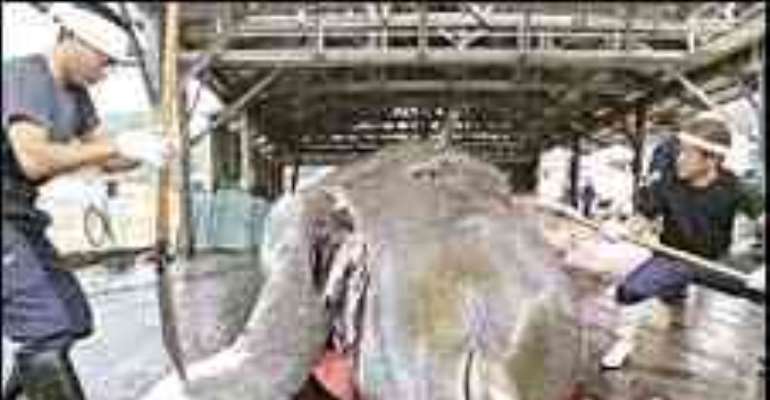JAPAN SEEKS TO ARREST SEA SHEPHERD ACTIVIST

The war between whalers and activists has heated up over recent years
The Japanese coastguard has obtained an arrest warrant for Canadian environmental activist Paul Watson for disrupting whale hunts, reports say.
Mr Watson's Sea Shepherd conservation society shadowed the annual Japanese whaling fleet through the Antarctic.
Mr Watson advocates direct action and has faced charges in Canada and Norway.
Japan hunts hundreds of whales each year for what it calls research, but environmentalists say the real purpose is to sell whale meat.
Sea Shepherd's campaign saw its vessels manoeuvring so close to Japan's whaling ships this January that one of its boats was sliced in two.
Legal steps
The Japan Coast Guard obtained an arrest warrant in Tokyo against Mr Watson for allegedly instructing members of his group to obstruct Japan's whaling mission and causing injury to Japanese crew, Japanese media reported.
National broadcaster NHK also reported that Japan would seek the 59-year old Canadian's arrest through the International Criminal Police Organisation (Interpol).
Culture clash over whaling
Whale of a dilemma
Confrontations between Japanese whaling ships and the activists during the recent whaling season near the Antarctic has already led to the arrest of a New Zealand anti-whaling activist who boarded a Japanese harpoon ship.
Pete Bethune, also of the Sea Shepherd Conservation Society, boarded the Shonan Maru 2 in February, and tried to make a citizen's arrest of its captain.
If found guilty of five offences, including trespass and causing injury, Mr Bethune could face up to 15 years in prison.
Mr Bethune had been in command of Sea Shepherd's hi-tech speedboat, the Ady Gil, when it was sliced in two in a collision with the Shonan Maru 2 in January. All six crew members escaped unharmed.
The crew of the Shonan Maru said the activists had tried to tangle a rope in their propeller and had thrown butyric acid at the ship, giving a “chemical burn” to one sailor.
But Sea Shepherd has denied any of its activists caused injury and said the substance thrown was harmless, if unpleasant, rancid butter.
Japan abandoned commercial whaling in 1986 after agreeing to a global moratorium – but international rules allow it to continue hunting under the auspices of a research programme.
